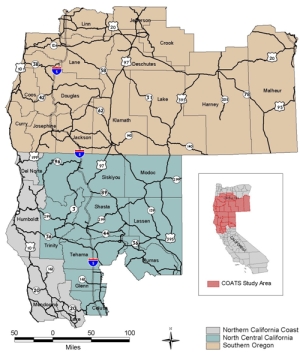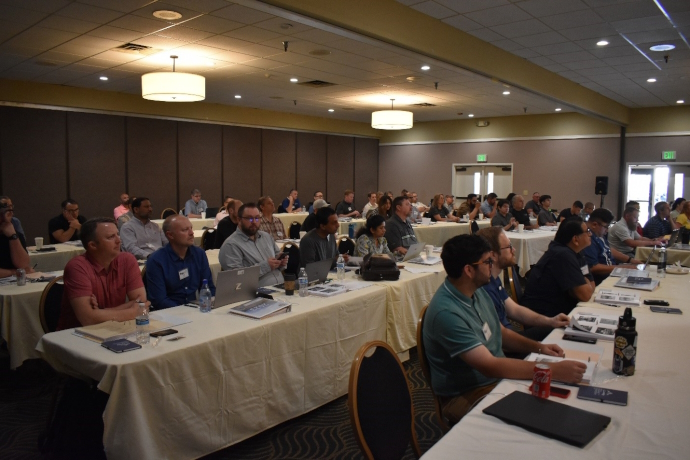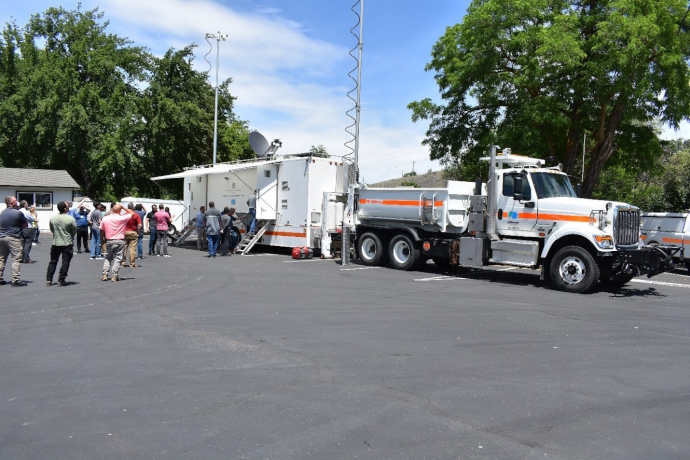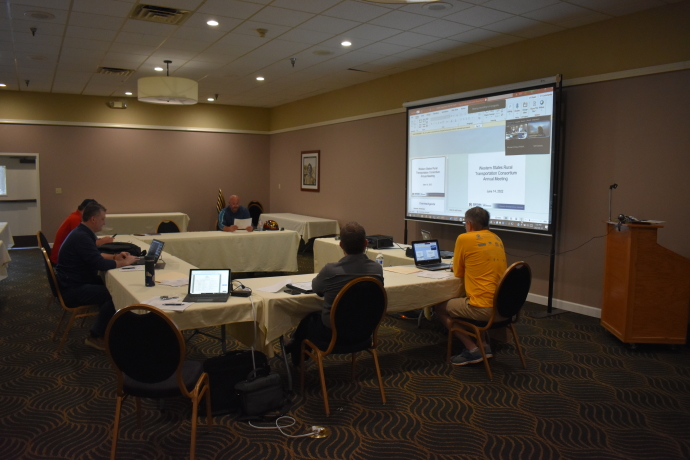California Oregon Advanced Transportation Systems (COATS)
- OVERVIEW |
- HISTORY |
- CONTACTS |
- UPDATE |
- ARCHIVED UPDATES |
- DOCUMENTS |
- FACT SHEET |
- PHASE 4 |
- PHASE 5 |
- PHASE 6 |
- PHASE 7 |
- PHASE 8 |
For 25 years, the California Oregon Advanced Transportation Systems (COATS) program demonstrated that a bi-state partnership to address rural ITS concerns is both feasible and advantageous. It allowed for maximization of resources and provided a source for fresh ideas and perspectives. It provided a platform to address the issues and concerns of rural areas that might otherwise remain ignored. Numerous systems and approaches have been developed and evaluated over the years, providing useful information on which to base future deployment decisions. Several of these initial systems are still in place, addressing the concerns they were designed to. Finally, COATS has provided a platform on which to conduct expanding efforts geared toward outreach and tech transfer. The roots of the COATS program stretch back to 1991. Caltrans recognized that there were rural concerns in dealing with advanced technologies that would evolve into Intelligent Transportation Systems (ITS). In 1995, efforts were begun to specifically examine ITS technologies in a rural context through a scoping study. This scoping study, the Program for Advancing Rural Transportation Technologies (PARTT), reviewed advanced transportation technologies, identified key issues concerning them, and developed conceptual ideas for future activities. As part of this work, a geographic area in Northern California designated a study area to refine the need and application of ITS in a rural environment. Caltrans and the Oregon Department of Transportation (ODOT) expanded the Northern California study area into Southern Oregon to maximize resources, foster cooperation, and investigate feasibility of ITS in a bi-state study area. All of these activities laid the foundation for what COATS would become. In 1998, the Western Transportation Institute (WTI) at Montana State University, Bozeman, was selected to carry out further studies. This effort, subsequently titled COATS, focused on ITS planning and architecture in the previously identified study area. Notably, the COATS project resulted in the development of the first two Rural Transportation Management Centers in California, one in Redding and one in Eureka. Additionally, the work resulted in deployment of an early-winner project. The specific activities of this phase of COATS, as well as subsequent phases, are outlined in the COATS project History. |
 |
Recent Updates:
Check back soon for more California Oregon Advanced Transportation Systems (COATS) updates.
UPDATE: Friday, November 3rd, 2023
End of an Era – COATS Project Draws to a Close

For 25 years, the California Oregon Advanced Transportation Systems (COATS) program demonstrated the value of cross border collaboration to tackle the challenges of rural transportation. The COATS partnership facilitated numerous successful research projects that resulted in practical implementations with a direct impact on not only the COATS bi-state area, but over the larger western region as well. The concept for the Western States Rural Transportation Technology Implementers Forum emerged from the COATS partnership with the 19th annual event planned for June 2024. Through attendance at the Forum, other state DOTs expressed interest in joining the COATS partnership and in 2010, the Western States Rural Transportation Consortium (WSRTC) was established. (See COATS History.)
This year marked the end of an era so to speak as the eighth and final phase of the COATS project concluded. The primary goal of COATS Phase VIII was to build on the success of earlier COATS phases to preserve and expand the COATS region as an innovator in rural ITS demonstration. To help the partnership achieve this goal, project activities focused on technology transfer through the Western States Forum, the Forum Handbook, and maintaining and expanding the COATS web presence for the technology transfer of project results. You can review the Final Report here or on the COATS Phase VIII Documents page.
The COATS Phase VIII work plan had five tasks including Project Technical Advisory Panel (PTAP) meetings, the Western States Forum, and the Forum Handbook.
Western States Rural Transportation Technology Implementers Forum
With the support of the COATS partnership, the Western States Forum has been established as a premier event for technology transfer about rural ITS to engineers, technicians, designers, and maintainers. Phase VIII provided financial and logistical support for the 2020 Forum, the 2021 Forum, and the 2022 Forum, and a portion of the 2023 event. To see the variety of topics addressed at these events, take a look at the technical agendas on the Forum website. The Forum is unique in that presentations are in-depth and detailed – speakers get into the ‘nuts and bolts’ of actual rural ITS deployments as they share successes, failures, and problems. Participants learn what does and doesn’t work and why.
Individual and diverse participation at the Forum indicates its growth and success. Since the inaugural event in 2006, the Forum has hosted more than 650 participants, with nearly 300 individuals from 14 different states (Alaska, Arizona, California, Idaho, Iowa, Massachusetts, Montana, Nevada, Oregon, Texas, Utah, Washington, Wisconsin, and Wyoming), representing the U.S. Department of Transportation (DOT), ten state DOTs, thirteen universities, multiple municipal transportation departments, the Idaho National Laboratory, the Southwest Research Institute, the California Highway Patrol, the California Department of Water Resources, all twelve Caltrans districts, and multiple offices and divisions within Caltrans.
Attendees repeatedly have positive comments for the event and are enthusiastic about returning for the next Forum. Some examples:
- “Great opportunity to use technologies and lessons learned from other DOTs in my State.”
- “Really enjoyed the conference and the presentations. Well worth my time.”
- “As usual, very informative. Caltrans benefits from this every year. Excellent way of creating contacts and support for high tech projects.”
- “One of the best conferences for us to attend.”
- “The technical detail was very interesting and helpful. Much better than a typical "overview" of a topic type presentation.”
- “Excellent format and group of people.”
- “... very interesting. No engineer can know too much. Keep the knowledge flowing.”
- “Good diversity; interesting and useful topics.”
- “Looking forward to bringing the next generations to this Forum.”
- “The majority of the presentations were very timely and all information I can take back and use in our decision-making process.”
- “I enjoyed the subject matter, the size of conference and the focus on the details not the vendors.”
- “This is a great event and I'm happy I attended and will attend again.”
Here's the audience at the 2023 Forum:

Photo by Doug Galarus
The Caltrans Office of Radio Communications brought over their satellite communications truck and trailer from District 1 and did a parking lot demonstration to accompany their presentation. Here the trailer and all of the communications equipment are deployed as Forum participants get a hands on look at the technology.

Photo by Doug Galarus
Forum Handbook
The How-To Handbook/Manual for the Western States Forum was updated after each of the Forum events. The Handbook is intended to document the Forum in such a way that the event and its standard of excellence can be easily continued even as staffing and other inevitable changes occur.
Meetings
COATS/WSRTC PTAP meetings and ITS related conferences also provided tech transfer opportunities with discussion of current and future ITS activities in the region. Stakeholders also met and guided planning and decision-making related to the COATS project.
Five meetings were held involving the entire PTAP – Northwest Transportation Conference 2020, Corvallis, OR (March 10, 2020); March 2021 virtual meeting (March 9, 2021); Annual Meeting 2021 at the Western States Forum (October 5, 2021); April 2022 virtual meeting (April 7, 2022); Annual Meeting 2022 at the Western States Forum (June 14, 2022). WSRTC members also attended the ITE Annual Meeting + Exhibit and National Rural ITS Conferences in summer of 2020, 2021, and 2022. The 2020 (August 4 – 13, 2020) and 2021 (July 20 – 29, 2021) events were held virtually while the 2022 event (July 31 – August 3, 2022, New Orleans, LA) was held in person. In addition, WSRTC members participated in ITS America (December 7-10, 2021, Charlotte, NC) and ITS World Congress (September 18 – 22, 2022, Los Angeles, CA).
Here’s the group at the 2022 annual meeting. Participants were there in person and virtually. Clockwise from top middle: Jim Whalen (Nevada DOT), screen with virtual participants, Sean Campbell (Caltrans DRISI, Project Manager), Jeremiah Pearce (Caltrans District 2), Tony Leingang (Washington State DOT), Doug Spencer (Oregon DOT).

Photo by: Doug Galarus
Aside from the organization and conduct of these meetings, associated deliverables included meeting presentations, meeting minutes, and related website updates. Meeting documents can be found at http://www.westernstates.org/Documents/WSRTC/Default.html. Website updates are on the Consortium’s website at http://www.westernstates.org/Projects/Updates/Default.html.
The COATS partnership has been productive and successful at addressing rural transportation issues with Intelligent Transportation Systems, making a lasting impact in the western states region. We encourage you to review the COATS Project History page and the COATS Project Fact Sheet to read all that has been accomplished through this project partnership.
The work of the COATS Project continues under the scope of the Western States Rural Transportation Consortium. Check back for regular updates!
Project Contacts:
|
|
|
|
|
|




